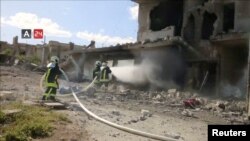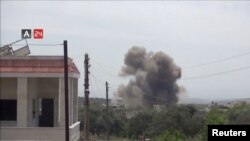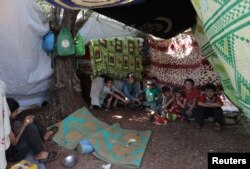The United Nations condemned attacks on health facilities in Syria's northwest Idlib province Friday and warned that a military offensive there by the Bashar al-Assad regime with Russian support risked "catastrophic humanitarian fallout" if it continued.
"Since late April, this escalation in violence has reportedly killed and injured over a hundred civilians and further displaced 180,000," U.N. political chief Rosemary DiCarlo told an emergency meeting of the U.N. Security Council. "The aerial bombardment is alarming, including the use of barrel bombs on populated areas."
In September, a deal was struck with the assistance of Russia and Turkey to make Idlib a "de-escalation" zone. The area is now largely controlled by Hayat Tahrir al-Sham (formerly known as Jubhat al-Nusra), a U.N.-listed terrorist group that has links to al-Qaida.
More than 3 million Syrians live in Idlib, many of them displaced from other parts of the country, and the U.N. has warned for months that a full-scale military operation there against the terrorists risked triggering a humanitarian catastrophe.
"The international community agrees that the presence of HTS in Idlib must be addressed," DiCarlo said, referring to Hayat Tahrir al-Sham by its initials. "But with 3 million civilians in close quarters, combating terrorism cannot be allowed to supersede obligations under international law."
Especially troubling is the surge in attacks on hospitals and schools in recent weeks.
The United Nations says 17 schools have been damaged or destroyed and at least 18 health facilities have been hit with aerial bombs, shelling or other fighting within the de-escalation zone.
"Some facilities have been hit twice. Other hospitals are closing for fear of being attacked," said U.N. humanitarian chief Mark Lowcock. He told the council that in all, 49 health facilities had partly or totally suspended their activities, leaving tens of thousands of people without access to health care.
Protected sites
Medical facilities have special protections under the Geneva Conventions and international humanitarian law, and targeting them can be a war crime.
In Syria, as in other conflicts, humanitarians give the details of some hospital locations to the warring parties so they can avoid targeting them, leaving the British ambassador questioning whether such protective mechanisms are failing or whether certain parties are deliberately using the information to target sensitive civilian infrastructure.
"I'd like to know, since we know that Russia and Syria are the only countries that fly planes in the area," Ambassador Karen Pierce said. "And if the answer is the Russian and Syrian air forces, I call on both ambassadors here today to give us an assurance that the attacks will stop, and there will be no more deliberate targeting of civilians in this manner in facilities that every single member of the international community has a duty to protect."
Russian, Syrian denials
"We categorically reject accusations of violations of international humanitarian law," Russian Ambassador Vassily Nebenzia told the council. "Not the Syrian army, not the space and air force of Russia, are conducting hostilities against civilians or civilian infrastructure. Our goal is the terrorists."
He said Russia refused to consider terrorists "untouchable" and would continue to target them.
Syria's envoy echoed that, saying there were "no random attacks" against civilians, just military operations to root out terror groups and liberate civilians from their grasp.






